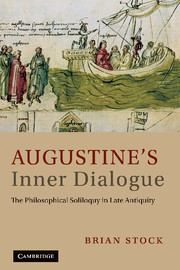3 - Order and freedom
Published online by Cambridge University Press: 10 January 2011
Summary
Da quod iubes et iube quod uis.
Conf., 10.37.60INTRODUCTION
In Augustine's writings ascetic, mental, or spiritual disciplines, such as the soliloquy, are constrained by predetermined forces, whose ultimate source is divine. Two of these forces are discussed in detail in his early writings, namely natural and historical laws. In this chapter Augustine's treatment of these subjects is taken up in a pair of works from the first years of his literary activity: De Ordine, composed in 386–387, and De Libero Arbitrio, begun in 387–388 and completed by 395.
These works confirm the direction for Augustine's soliloquies which has been suggested in Chapter 2. In the course of this discussion I attempted to show that there are two trajectories in his thinking on the topic of such spiritual exercises. First, he frames his discussion of the cogito within a narrative design which includes his personal life history as well as the history of civilization. Secondly, as he proceeds, Platonic, Neoplatonic, and Stoic approaches to the problem of personal improvement, which stress the autonomy of the self, are replaced by a dependent notion of the self based on biblical teachings, in particular those of Paul.
This transition from an autonomous to a dependent notion of the self is well illustrated by a reading of De Ordine and De Libero Arbitrio. In De Ordine, Augustine is largely psychological and philosophical in his thinking about the self.
- Type
- Chapter
- Information
- Augustine's Inner DialogueThe Philosophical Soliloquy in Late Antiquity, pp. 121 - 180Publisher: Cambridge University PressPrint publication year: 2010

